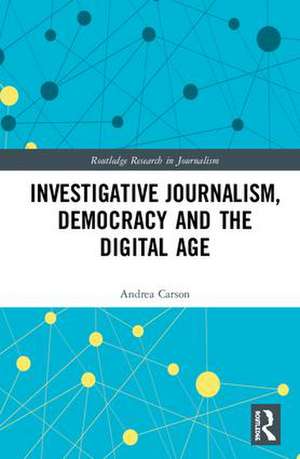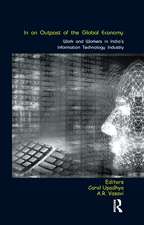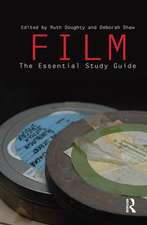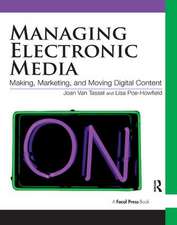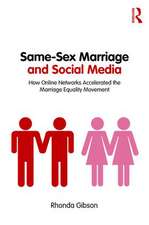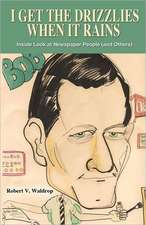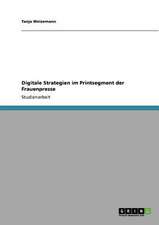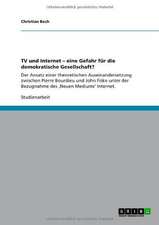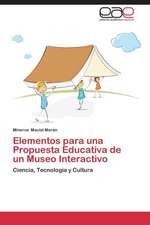Investigative Journalism, Democracy and the Digital Age: Routledge Research in Journalism
Autor Andrea Carsonen Limba Engleză Hardback – 8 iul 2019
| Toate formatele și edițiile | Preț | Express |
|---|---|---|
| Paperback (1) | 372.84 lei 6-8 săpt. | |
| Taylor & Francis – 30 iun 2021 | 372.84 lei 6-8 săpt. | |
| Hardback (1) | 935.50 lei 3-5 săpt. | +22.70 lei 6-12 zile |
| Taylor & Francis – 8 iul 2019 | 935.50 lei 3-5 săpt. | +22.70 lei 6-12 zile |
Din seria Routledge Research in Journalism
-
 Preț: 310.60 lei
Preț: 310.60 lei - 9%
 Preț: 1006.49 lei
Preț: 1006.49 lei -
 Preț: 272.79 lei
Preț: 272.79 lei -
 Preț: 311.33 lei
Preț: 311.33 lei -
 Preț: 318.82 lei
Preț: 318.82 lei -
 Preț: 309.79 lei
Preț: 309.79 lei -
 Preț: 301.58 lei
Preț: 301.58 lei -
 Preț: 302.60 lei
Preț: 302.60 lei -
 Preț: 334.02 lei
Preț: 334.02 lei - 13%
 Preț: 289.66 lei
Preț: 289.66 lei - 13%
 Preț: 289.78 lei
Preț: 289.78 lei -
 Preț: 376.10 lei
Preț: 376.10 lei - 13%
 Preț: 329.97 lei
Preț: 329.97 lei -
 Preț: 376.10 lei
Preț: 376.10 lei -
 Preț: 389.60 lei
Preț: 389.60 lei -
 Preț: 376.10 lei
Preț: 376.10 lei - 18%
 Preț: 998.71 lei
Preț: 998.71 lei -
 Preț: 395.56 lei
Preț: 395.56 lei - 16%
 Preț: 263.77 lei
Preț: 263.77 lei -
 Preț: 442.50 lei
Preț: 442.50 lei -
 Preț: 376.10 lei
Preț: 376.10 lei - 18%
 Preț: 1001.07 lei
Preț: 1001.07 lei -
 Preț: 376.10 lei
Preț: 376.10 lei - 15%
 Preț: 209.80 lei
Preț: 209.80 lei - 43%
 Preț: 188.21 lei
Preț: 188.21 lei - 26%
 Preț: 763.13 lei
Preț: 763.13 lei - 18%
 Preț: 1003.75 lei
Preț: 1003.75 lei - 18%
 Preț: 1052.35 lei
Preț: 1052.35 lei -
 Preț: 376.10 lei
Preț: 376.10 lei -
 Preț: 389.38 lei
Preț: 389.38 lei -
 Preț: 382.86 lei
Preț: 382.86 lei - 18%
 Preț: 1001.07 lei
Preț: 1001.07 lei -
 Preț: 422.59 lei
Preț: 422.59 lei
Preț: 935.50 lei
Preț vechi: 1028.02 lei
-9% Nou
Puncte Express: 1403
Preț estimativ în valută:
179.01€ • 186.53$ • 148.22£
179.01€ • 186.53$ • 148.22£
Carte disponibilă
Livrare economică 13-27 martie
Livrare express 26 februarie-04 martie pentru 32.69 lei
Preluare comenzi: 021 569.72.76
Specificații
ISBN-13: 9781138200524
ISBN-10: 1138200522
Pagini: 266
Ilustrații: 26 Line drawings, black and white; 1 Halftones, black and white
Dimensiuni: 152 x 229 x 22 mm
Greutate: 0.51 kg
Ediția:1
Editura: Taylor & Francis
Colecția Routledge
Seria Routledge Research in Journalism
Locul publicării:Oxford, United Kingdom
ISBN-10: 1138200522
Pagini: 266
Ilustrații: 26 Line drawings, black and white; 1 Halftones, black and white
Dimensiuni: 152 x 229 x 22 mm
Greutate: 0.51 kg
Ediția:1
Editura: Taylor & Francis
Colecția Routledge
Seria Routledge Research in Journalism
Locul publicării:Oxford, United Kingdom
Public țintă
Postgraduate and UndergraduateCuprins
Introduction: Studying Investigative Journalism
1 From 'Rivers of Gold' to the Digital Economy
2 What is Investigative Journalism?
3 Why Watchdog Reporting Endures: Theories about the Public Sphere, Media Power and Democracy
4 Six Decades of Investigative Journalism: The 1950s to the 2000s
5 The Rise of Collaborative Investigative Journalism
6 New Frontiers: Big Data, Leaks and Large-Scale Investigative Journalism
7 Bankrolling Journalism to Support Investigative Reporting
Conclusion: The Future of Investigative Journalism, Reasons for Optimism
1 From 'Rivers of Gold' to the Digital Economy
2 What is Investigative Journalism?
3 Why Watchdog Reporting Endures: Theories about the Public Sphere, Media Power and Democracy
4 Six Decades of Investigative Journalism: The 1950s to the 2000s
5 The Rise of Collaborative Investigative Journalism
6 New Frontiers: Big Data, Leaks and Large-Scale Investigative Journalism
7 Bankrolling Journalism to Support Investigative Reporting
Conclusion: The Future of Investigative Journalism, Reasons for Optimism
Notă biografică
Andrea Carson is a political scientist and an Associate Professor in the Department of Politics, Media and Philosophy at La Trobe University in Melbourne, Australia. She has authored numerous articles on investigative journalism, Australian politics, election campaigns and digital media. Her most recent co-authored book is Australian Politics in the Twenty-First Century: Old Institutions, New Challenges (2018). She was awarded Australian Research Council (2018-2021) funding as part of a team using big data to understand the media’s role in political debate and policy decisions. She holds a PhD in Political Science and a Master of Arts in International Politics. She has taught courses on journalism, political communication, women in politics, and campaigns and elections. She worked as a newspaper journalist and section editor at The Age in Melbourne from 1997-2001 and as a radio broadcaster (RRR) and radio and television producer (Australian Broadcasting Corporation) from 2001-2010. She is a regular media commentator and examines the latest media trends and issues for The Conversation’s ‘Media Files’ with colleagues, available on iTunes.
Descriere
Investigative Journalism, Democracy and the Digital Age explores watchdog reporting in the digital age. Mapping new forms of global collaborative investigative journalism, the book debunks the myth that traditional newsrooms and investigative journalism are dying, and shows how journalists are adapting and experimenting.
